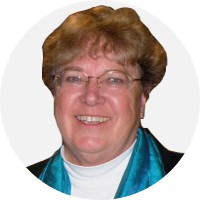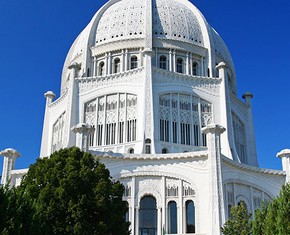The views expressed in our content reflect individual perspectives and do not represent the authoritative views of the Baha'i Faith.
There’s a power in silence. I have experienced silence outdoors, in the wilderness, but to experience it in an auditorium filled with a thousand people is transcendent.
I was privileged to witness this deep, contemplative, spiritual silence as a staff member at the Baha’i World Centre in Haifa, which hosts the Baha’i world’s International Conventions every five years to elect the Universal House of Justice—the democratically-elected body that leads the global Baha’i community.
During each election, for a half-hour, or perhaps 45 minutes, Baha’is from all over the world sit and open their hearts for divine inspiration to guide them in their selection of nine people to serve on the international governing body of the Baha’i Faith. It always takes place in Haifa, Israel, and it happened again on April 29th this year. It is the only truly global election.
Baha’is hold these elections because the Baha’i Faith has no clergy. The affairs of the community are guided by people freely elected by their co-religionists at the local, national and international levels. But the Baha’is themselves didn’t create their administrative order—the nature and purposes of these elected bodies are described in considerable detail in the writings of Baha’u’llah, Abdu’l-Baha, and Shoghi Effendi, the Guardian of the Baha’i Faith. Based on these original writings, the Universal House of Justice has a Constitution which reads, in part:
Among the powers and duties with which the Universal House of Justice has been invested are: … to foster that which is conducive to the enlightenment and illumination of the souls of men and the advancement and betterment of the world.
The Baha’i teachings say that the obligation of the Universal House of Justice is to care for “the souls of men” (and women)—that is, to foster that which is conducive to all of the people of the world, not just registered members of the Baha’i Faith. Baha’u’llah wrote:
The fundamental purpose animating the Faith of God and His Religion is to safeguard the interests and promote the unity of the human race, and to foster the spirit of love and fellowship amongst men. – Tablets of Baha’u’llah, p. 168.
I have been honored to serve at the Information Desk for three International Conventions, and to help welcome the guests. They were all members of Baha’i National Spiritual Assemblies, who had been elected by the Baha’is in their nations. They came from every corner of world—men and women, black and white, rich and poor. In addition to participating in the election, during the time of the International Convention the delegates visit the Baha’i holy places in the area, share their experiences during consultative sessions, and enjoy performances celebrating the global diversity of the Baha’i community. The Conventions are filled with joy, unity and a certain sense of wonder.
The last full election was on April 29, 2013, when more than a thousand Baha’is from the National Spiritual Assemblies of 157 countries attended the 11th International Baha’i Convention in Haifa. For the Baha’i World Centre, hosting more than a thousand people from 157 countries is a joy and a challenge. Of course, language is an issue. While the formal meetings are held in English, official translations are provided in Spanish, French, Russian, Persian, Arabic and more. If delegates come from a country with a relatively rare language, usually one of the nine members of the National Spiritual Assembly is able to translate from an official language into the local language.
Normally the Convention itself is four days long, with delegates coming a day before and staying a day after, so they need places to sleep. The Baha’i World Centre staff pre-book practically every hotel room in the area, needing to accommodate a wide range of budgets as the delegates usually pay for their own expenses. Then transportation has to be arranged to get the delegates to the right places at the right time. One of the first things some delegates learn is that if the Universal House of Justice has announced that a gathering will start at a certain time—10:00 a.m., for example—that gathering will start at 10:00 a.m. sharp. Not all cultures include that tradition of promptness, but generally the Baha’is learn pretty quickly to adjust to “World Centre time.”
Of course, food is a challenge, too, as people from diverse cultures are used to a wide range of diets. I was standing by a hotel’s breakfast buffet, which had a “typical Israeli” breakfast: eggs, sliced tomatoes and cucumbers, and a wide variety of dairy products next to breads and rolls. Baha’i delegates came in from an African country that did not have cheese as a normal part of its diet, and some of the friends were quite perplexed. Pointing to the offerings of yogurt and sour cream, cottage cheese, Swiss chess, Gouda and so on, one man asked what it all was. “Oh, those are different tribes of cheeses,” a delegate said who had travelled outside his country before—such sweet sharing.
The International Convention hosts a thousand delegates, many thousands of stories, and yet has one overriding purpose: to elect the members of the new Universal House of Justice to guide the Baha’i community for the next five years. It is no simple task—but it has no political elements, either. Amazingly, there are no nominations in Baha’i elections, and no campaigning, so each delegate has to quietly decide for him- or herself which nine Baha’is in the world would be best to serve on “the Supreme Institution.”
Of course, the National Assembly members had all been elected the year before, so they each had 12 months to think and pray about the upcoming election of the Universal House of Justice. Perhaps some of them had begun making a list of people they might vote for, starting with devoted Baha’is from their own area, and then adding the names of the subjects of Baha’i news stories that impressed them, or outstanding speakers at Baha’i conferences. Or not. Probably each delegate has his or her own process.
In any case, the morning of the election begins with prayers in many languages. Each delegate is aware that they will soon discharge a divine responsibility, so the air is charged with meaning. Prayers are read. Then the chair of the gathering calls for silence to give the delegates time to open their hearts for divine guidance. There is a power in that silence. It is transcendent. Most importantly, it works.

















Comments
Sign in or create an account
Continue with Googleor